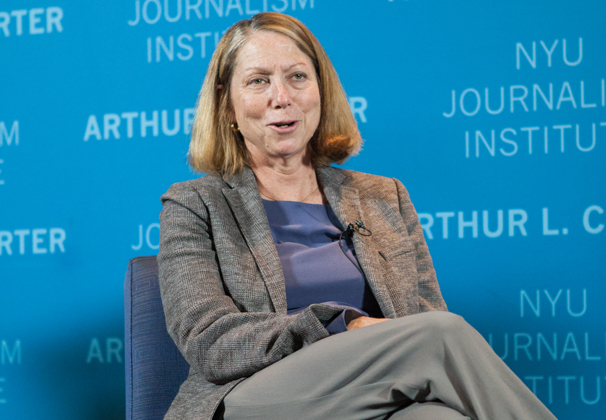
Jill Abramson, the first woman to serve as executive editor of The New York Times, spoke last night at the NYU Arthur L. Carter Journalism Institute. With her tattoo of a Subway token and obvious passion for New York, Abramson opened up about her career path, life as the executive editor and how purviewing the New York Times developed her love of reading.
“Since Jill Abramson is one of the top journalists in America, I thought her insights would be invaluable for our students,” said Meryl Gordon, director of magazine writing at NYU and the host of the event.
Gordon said that Abramson is an editor during a period of great change in the journalism world. The New York Times has been in the spotlight for recent buyouts and the installation of a paywall for website content. Abramson pointed out the success that the newspaper has had with subscribers since the installation despite speculation that it would not succeed.
“It’s never been free,” Abramson said. “We think New York Times journalism is on a quality plane that is different and very much worth paying for. They were all saying ‘no one will ever pay for news because news wants to be free.’ We have proven that wrong.”
She also talked about the coverage of Hurricane Sandy and how it was important to cover the timely and breaking news but also to wade deeper into stories and stay there. Reporters that can cover stories with long-form narratives in a more sustained way is valuable and something few other news outlets were mounting.
She said that during Hurricane Sandy and during the 2012 election, the Times removed the paywall on the website.
“There are certain really big news days where gathering information and presenting it is just a vital public service,” Abramson said.
When asked about her advice for aspiring journalists, she wanted to avoid the term, “brand.” Instead, she touched on the importance of social media skills and the ability to find a unique angle in a story. Above all though, a journalist’s writing skills are still the most important.
Gordon also mentioned that many writers described Abramson as intimidating and remote — a comment Abramson lightheartedly joked about throughout the evening, proving that she was the exact opposite. Abramson said she tries to be approachable and interact with the employees at the Times, having had lunch with a group of journalists that day.
“As an aspiring journalist who is also a woman, it’s nice to see such an empowering female figure in such a major position in the journalistic world,” said LSP freshman Nicole Del Muro. “I feel like journalists our age are very worried about the future of journalism. It was refreshing to hear someone in the industry say that print journalism isn’t necessarily dead.”
Julie DeVito is the foreign correspondent editor. Email her at [email protected].























































































































































